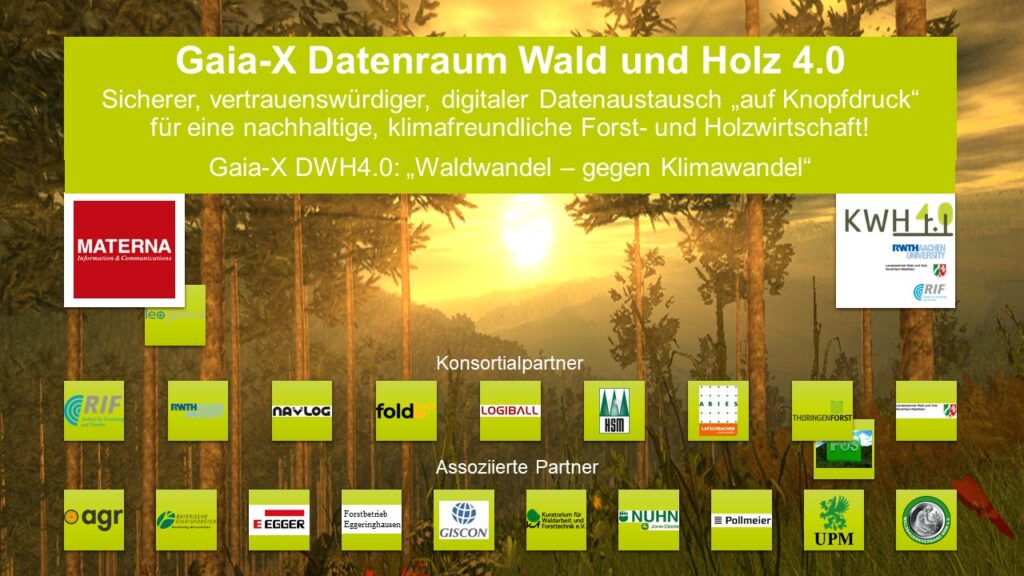Kategorie: ‘Allgemein’
(Deutsch) RWTH bündelt Stärken zum Thema Kreislaufwirtschaft
(Deutsch) 2Exciting Ausbildungsnetzwerk – Die nächste Generation von 2D-Expert*innen fördern
Strengthen university teaching through digitalisation – RWTH works with partners in the „Innovationscluster E-Assessment“
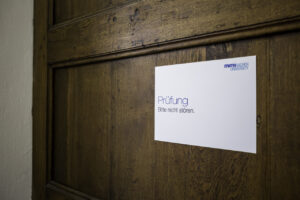
Copyright: Martin Braun
A central issue at universities is to create the best possible examination conditions for students and to support lecturers. In recent years, more and more examinations have been conducted as e-assessments, and Corona has accelerated this trend. The aim of the new innovation cluster is to promote more student-friendly examination scenarios by further developing e-assessment formats such as “Dynexite” and “ILIAS” with a focus on diversity equality, competence orientation, interdisciplinarity and time flexibility in the course of semesters and studies.
For example, hybrid examinations should be possible, integrating analogue and digital processing. The aim is also to make examinations more flexible; students can then take an examination within a specified time window. An examination cockpit supports teachers with recommendations for didactic development and iterative improvement of examinations.
RWTH Aachen University is working together on this in sub-projects. Under the direction of Professor Dr. rer. nat.Dirk Uwe Sauer , the Institute for Power Electronics and Electrical Drives is working on making the examination phases more flexible.
The overall project management is in the hands of Dr. phil. Malte Persike from the RWTH’s Centre for Teaching and Learning Services, who is working on the adaptation and further development of competence-oriented task formats for e-examinations. The teaching and research area of Computer Science 9 (Learning Technologies), headed by Professor Dr.-Ing. Ulrik Schroeder, focuses on the integration of domain-specific examination tools in “Dynexite” and their adaptability to the e-examination system “ILIAS”. Here, task formats for Python- and R-code are being developed and an examination cockpit is being programmed to improve examination quality.
The “Innovation in der Hochschullehre” Foundation (Innovation in University Teaching) is funding the joint work of RWTH Aachen University, Cologne University of Technology, the Distance-Learning University Hagen and the German Institute for Adult Education with about 2.3 million euros.
More diversity in science – Prof. Monti as a scout in the Henriette Heart Scouting Program
The Henriette Herz Scouting Program, funded by the BMBF, aims to expand and diversify the Alexander von Humboldt Foundation’s network. The program specifically recruits established and experienced researchers who already have an international network. It enables the scouts to select up to three scientists who will then directly receive a fellowship. The first will go to a female researcher.
The scouts aim to approach international researchers from abroad who have not yet been considered for an academic fellowship to the Humboldt Foundation and a research stay in Germany. As a result, the program will attract new collaborative partners for Germany, both from a specialist and geographical perspective. At the same time, the aim is to increase the quota of women sponsored in the Humboldt Research Fellowship Programme.
We are very pleased that Prof. Antonello Monti has been selected for the Henriette Herz Scouting Program.
“The program offers us the possibility to increase our international cooperation by creating new links with universities that are not currently working with us.
What is extremely interesting about this program is the possibility to be really fast in offering the scholarship. By skipping the standard review process, the time between identification of candidates to the start of the scholarship becomes extremely short.” – Prof. Monti
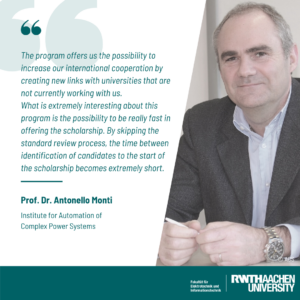
The Henriette Herz Scouting Program, funded by the BMBF, aims to expand and diversify the Alexander von Humboldt Foundation’s network. The program specifically recruits established and experienced researchers who already have an international network. It enables the scouts to select up to three scientists who will then directly receive a fellowship. The first will go to a female researcher.
The scouts aim to approach international researchers from abroad who have not yet been considered for an academic fellowship to the Humboldt Foundation and a research stay in Germany. As a result, the program will attract new collaborative partners for Germany, both from a specialist and geographical perspective. At the same time, the aim is to increase the quota of women sponsored in the Humboldt Research Fellowship Programme.
We are very pleased that Prof. Antonello Monti has been selected for the Henriette Herz Scouting Program.
“The program offers us the possibility to increase our international cooperation by creating new links with universities that are not currently working with us.
What is extremely interesting about this program is the possibility to be really fast in offering the scholarship. By skipping the standard review process, the time between identification of candidates to the start of the scholarship becomes extremely short.” – Prof. Monti

The Henriette Herz Scouting Program, funded by the BMBF, aims to expand and diversify the Alexander von Humboldt Foundation’s network. The program specifically recruits established and experienced researchers who already have an international network. It enables the scouts to select up to three scientists who will then directly receive a fellowship. The first will go to a female researcher.
The scouts aim to approach international researchers from abroad who have not yet been considered for an academic fellowship to the Humboldt Foundation and a research stay in Germany. As a result, the program will attract new collaborative partners for Germany, both from a specialist and geographical perspective. At the same time, the aim is to increase the quota of women sponsored in the Humboldt Research Fellowship Programme.
We are very pleased that Prof. Antonello Monti has been selected for the Henriette Herz Scouting Program.
“The program offers us the possibility to increase our international cooperation by creating new links with universities that are not currently working with us.
What is extremely interesting about this program is the possibility to be really fast in offering the scholarship. By skipping the standard review process, the time between identification of candidates to the start of the scholarship becomes extremely short.” – Prof. Monti
 The Henriette Herz Scouting Program, funded by the BMBF, aims to expand and diversify the Alexander von Humboldt Foundation’s network. The program specifically recruits established and experienced researchers who already have an international network. It enables the scouts to select up to three scientists who will then directly receive a fellowship. The first will go to a female researcher.
The Henriette Herz Scouting Program, funded by the BMBF, aims to expand and diversify the Alexander von Humboldt Foundation’s network. The program specifically recruits established and experienced researchers who already have an international network. It enables the scouts to select up to three scientists who will then directly receive a fellowship. The first will go to a female researcher.
The scouts aim to approach international researchers from abroad who have not yet been considered for an academic fellowship to the Humboldt Foundation and a research stay in Germany. As a result, the program will attract new collaborative partners for Germany, both from a specialist and geographical perspective. At the same time, the aim is to increase the quota of women sponsored in the Humboldt Research Fellowship Programme.
We are very pleased that Prof. Antonello Monti has been selected for the Henriette Herz Scouting Program.
(Deutsch) E.ON und RWTH verlängern Kooperationsvertrag Erfolgreiche Arbeit des E.ON Energy Research Centers wird weiter gefördert
(Deutsch) FGE-Kolloquium: Sonnenfinsternis – eine Herausforderung für das europäische Verbundsystem der Stromnetze
CARL – Interdisciplinary Research Institution in Aachen
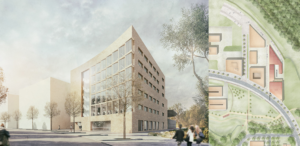
Copyright: KSG
A center for fundamental research into the ageing of battery materials and power electronic systems is currently being established at RWTH Aachen University. The “Center for Ageing, Reliability and Lifetime Prediction of Electrochemical and Power Electronic Systems“, CARL for short, is an interdisciplinary research facility where staff from ten core professorships and around 20 other chairs and institutes at RWTH Aachen and Forschungszentrum Jülich can conduct groundbreaking research. These include scientists from the disciplines of chemistry, physics, mathematics, computer science, materials science, mechanical and electrical engineering. The question of service life is essential when considering economic viability. For instance, this is important for car manufacturers, depreciation periods, warranties and to be able to assess reliability as part of functional safety.
(Deutsch) Mobilfunkexpertise in Nordrhein-Westfalen – BMBF wählt 6G-Forschungs-Hubs aus
Competence Cluster Battery Utilization Concepts (BattUtilization)
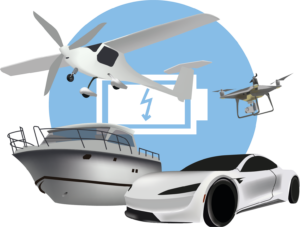
Copyright: ISEA
With the further spread of renewable energies and electromobility, powerful and reliable energy storage systems are becoming increasingly important. When is the secondary use of battery storage possible and for which applications is it useful? This question is being addressed by the project partners from research and industry in the new Battery Utilization Concepts ( BattNutzung) cluster, which is being funded by the German Federal Ministry of Education and Research with around 20 million euros. The cluster is coordinated by Prof. Sauer from ISEA. Together with the competence cluster greenBatt, the BattNutzung cluster forms the cross-sectional initiative “Battery Life Cycle”. This aims at a holistic view of second use and recycling concepts, which is to be enabled by linking the two clusters and through a cross-cluster exchange.


